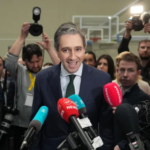Georgia president calls for new elections as protests erupt again
Georgia’s pro-Western president has announced she will remain in office until new parliamentary elections are held, amidst ongoing protests over the government’s decision to halt EU accession talks.
In an interview with the BBC, Salome Zourabichvili, who has aligned herself with the opposition, called the current parliament “illegitimate” following allegations of election fraud in last month’s vote.
Zourabichvili confirmed she would keep her presidential position, even though the newly elected parliament has stated it plans to select her successor on December 14.
Protests in the capital, Tbilisi, have continued for a third consecutive night. Riot police have been stationed outside the parliament, which has become the center of the protests. Officers used tear gas and water cannons into the early hours of Sunday, pushing demonstrators away from the parliament building. Similar demonstrations were reported in Batumi, Kutaisi, Zugdidi, and other regions across Georgia.
Zourabichvili said, “I’m offering this stability for the transition, because what these people on the streets are demanding is new elections to restore the country and its European path.”
Hundreds of civil servants have voiced their opposition to the government’s suspension of EU talks, arguing it goes against Georgia’s national interests. Additionally, Georgian ambassadors to Bulgaria, the Netherlands, and Italy have resigned.
On Saturday, the US announced it was suspending its strategic partnership with Georgia, citing the government’s “anti-democratic actions.”
Since 2012, Georgia has been governed by the Georgian Dream party, which critics claim has shifted the country away from the EU and towards Russia. Although Georgian Dream declared victory in last month’s election, opposition members are boycotting the new parliament, alleging election fraud.
On Thursday, the European Parliament passed a resolution condemning the election as part of Georgia’s “worsening democratic crisis,” holding the ruling party “fully responsible.” The resolution expressed concern over reports of voter intimidation, vote-buying, manipulation, and harassment of election observers.
Following the resolution, Georgian Prime Minister Irakli Kobakhidze said his government had “decided not to bring up the issue of joining the European Union on the agenda until the end of 2028”.
In response, thousands of pro-EU protesters started demonstrating outside Georgian Dream offices in the cities of Tbilisi and Kutaisi on Thursday.
A group of public figures, writers and journalists have also been protesting outside the country’s public broadcaster in the capital Tbilisi, accusing it of being a mouthpiece for the country’s ruling party.
“The public broadcaster must be freed from the influence of the Russians and the pressure of the regime,” said writer and activist Lasha Bugadze.
“The public broadcaster covers the whole of Georgia and they are brainwashing our population with propaganda, people who may not be sure what is going on,” he said.
Four opposition coalitions and parties that won seats in last month’s parliamentary elections but refused to take up their mandates citing widespread vote rigging have issued a joint statement, calling for fresh elections under international supervision.
“Parties with a legitimate mandate of the Georgian people will confront the illegitimate regime of Georgian Dream and the systemic violence against peaceful demonstrators and journalists,” read the statement.
In a statement, the US condemned the “excessive use of force” in Georgia and called on all sides to ensure the protests remain peaceful.
“The Georgian people overwhelmingly support integration with Europe,” a statement from the State Department said.
Some 150 people were detained following the 29 November protests in the capital Tbilisi. Police used water cannon, tear gas and rubber bullets to disperse the protesters.
At dawn on 30 November the police crackdown intensified as they began chasing the demonstrators, with reports of protesters being kicked and beaten with batons.
The prime minister said that 50 police officers were injured at the hands of “violent protesters who threw Molotov cocktails, pyrotechnics, glass, stones at the police”.
Kobakhidze has also lashed out at European politicians for “hurling a cascade of insults” at the Georgian government.



